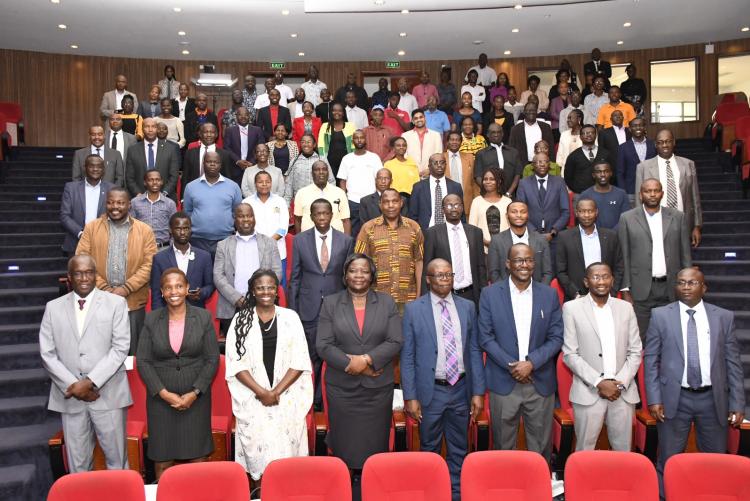On September 20th, 2023, the University of Nairobi hosted a landmark event, the Kenya National Open Science Dialogue, at the Chandaria Auditorium. The event brought together esteemed academics, researchers, and policymakers to discuss the transformative potential of open science in Kenya. Among the distinguished speakers was the Vice-Chancellor Prof. Kiama, and Dr. Roselida Owuour, Deputy Director of Research from the State Department for Higher Education and Research, Ministry of Education.
In his opening remarks, Prof. Kiama emphasized the University of Nairobi's commitment to the pursuit of knowledge, innovation, and the advancement of science. He highlighted the institution's impressive achievements in research, with a notable presence of its scholars among the top 1000 scientists in Kenya. ‘’This accomplishment underscores the university's leadership in higher education and research in the country’’. He noted.
Open science, as described by Prof. Kiama, fosters transparency, accessibility, and efficiency in scientific research. It encourages the dissemination of information, data, and outputs through open access and open data channels. By embracing open science, researchers and students gain increased visibility, collaboration opportunities, and access to a global audience. The Kenya National Open Science Dialogue aimed to identify challenges in the implementation of open science, define a roadmap for Kenya's national open science initiatives, and enhance education and awareness about open science and open access within the academic community. Prof. Kiama emphasized the pivotal roles of researchers, librarians, and students in advocating for open access materials and facilitating the dissemination of scholarly resources.
In his concluding remarks, the VC noted open science and open access can lead to the creation of new scientific knowledge and science-based solutions that benefit both nature and human welfare. In an era characterized by increasingly complex global challenges, open science becomes a vital tool for finding collaborative solutions that transcend borders.
Dr. Roselida Owuour, representing the State Department for Higher Education and Research, shared insights into the department's mandate and its commitment to shaping and promoting open science policies in Kenya's higher education and research sector. She outlined the various ways in which the department can contribute to the adoption and implementation of open science policies.
Firstly, the department holds the power to influence curricula, research methodologies, and knowledge dissemination. Embracing open science principles can create a more transparent and inclusive research environment, encouraging institutions to adopt open access publishing, open data sharing, and open educational resources.
Secondly, the allocation of funding and resources to research projects is a critical role played by the department. By aligning funding criteria with open science principles, the department can incentivize researchers and institutions to embrace openness, ensuring that research findings are made accessible to the public.
Collaboration is a cornerstone of open science, and the State Department can foster collaborations among researchers, both domestically and internationally. This collaboration can help researchers pool resources and expertise, accelerating scientific progress.
Moreover, education is central to the State Department's mission. By promoting open educational resources (OERs), the department can make quality educational materials more accessible to learners at all levels, ultimately improving the educational landscape in Kenya while adhering to data protection regulations.
The Workshop also featured a range of presentations highlighting the importance of open science. Speakers like Dr. Sylvance Okoth, Dr. Ana Parsic, Dr. Penninah Musangi, Dr. David Muthaka, Ms. Roheena Anand, Prof. Muliaro Wafula, Dr. Peggy Boateng, Dr. Richard L.K. Glover, and Joy Owango addressed various aspects of open science, from implementation mechanisms to policy recommendations, and from challenges in universities to the transformative potential of open science in Africa. The workshop provided a comprehensive exploration of the multifaceted dimensions of open science, emphasizing its significance for the academic and research community in East Africa.
In conclusion, The Kenya National Open Science Dialogue signifies a significant step towards fostering transparency, collaboration, and innovation in higher education and research in Kenya. The remarks made by Prof. Kiama and Dr. Roselida Owuour highlight the immense potential of open science to transform the research landscape in the country.
As Kenya embraces open science principles and policies, it stands poised to reap the benefits of increased transparency, accessibility, and collaboration in scientific research. With the support of institutions, government departments, and researchers, open science can bridge gaps, democratize education, and accelerate scientific progress, ultimately benefiting society as a whole. The Kenya National Open Science Dialogue serves as a beacon of hope, illuminating the path toward a brighter, more open future for science and research in Kenya.
- Log in to post comments

